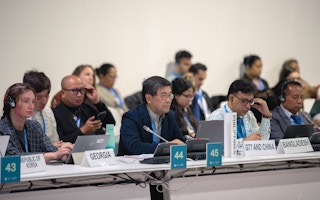By Maryam Afolabi
The level of awareness and sensitization about climate change has been growing steadily over the years, thanks to various initiatives such as conferences, workshops, and international summits organized by stakeholders.
One of the most notable initiatives is the UN Climate Change Conference, held annually in different countries since its inception in Berlin in 1995.
In recent years, Africa has witnessed a surge in participation in the climate change movement.
Beyond environmentalists and agricultural scientists who have long championed the cause, journalists have emerged as key players in raising awareness about climate change across the globe.

Through consistent reportage, investigative journalism, and participation in workshops and conferences, journalists have taken an active stance in promoting climate action.
As the journalism and media industry evolves, it has adopted new strategies to sustain audience interest, particularly among younger generations.
Social media and other digital platforms have become pivotal in shaping global issues, allowing journalists to reach wider and more diverse audiences.
Among these strategies, storytelling stands out as one of the oldest and most effective methods for engaging audiences.
Interestingly, the entertainment industry has also embraced storytelling as a core technique to captivate and connect with people.
Popular brands and powerful industries often collaborate with the media and entertainment sectors to remain relevant and engage the public effectively.
Given the immense influence of these industries on both older and younger generations, their collaboration in the climate change movement is crucial.
This was emphasized on September 24, 2024, during a climate change conference in Ilorin organized by PRISTINE SACC Education and Technology Initiatives.
The event, themed “Climate Change Reporting Through Arts and Journalism,” featured speakers who underscored how journalists could increase youth involvement in climate action by collaborating with entertainment professionals.
These professionals include musicians, artists, actors, skit makers, writers, and movie producers, among others.
While more people are beginning to accept that climate change is not a Western-manufactured concept but a global reality affecting every inhabitant of Earth, discussions about the issue often remain confined to the elite and educated classes.
This disparity underscores the need for creative strategies to bridge the gap and bring climate change conversations to the grassroots.
Entertainers, who naturally appeal to mass audiences, can play a significant role in this regard.
Social media influencers, skit makers, and musicians have demonstrated their ability to amplify messages to younger audiences effectively.
For instance, humorous and relatable skits on climate-related topics can spark conversations, while music can inspire and mobilize communities for action.
Similarly, writers and poets have unique roles to play in influencing their audiences.
Although their works may initially reach an educated demographic, vivid storytelling and imaginative narratives can inspire people across different social strata to take proactive steps toward climate action.
In conclusion, addressing climate change, like other global issues, requires a multifaceted approach.
By leveraging the media and entertainment industries’ wide-reaching influence, we can ensure that climate change receives the awareness and urgency it deserves.
Collaboration, creativity, and inclusivity are key to making climate action a collective global endeavor.
Maryam Afolabi is a news editor and a passionate advocate of Climate Change, she writes from Ilorin.
You can reach her on 08130047863, maryamoyin@gmail.com

